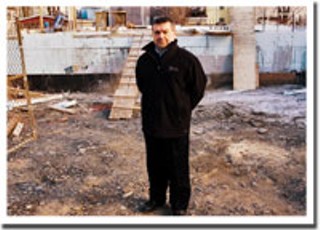If you lamented the bulldozing of the Italian Cultural Centre Association this fall, the brick Agricola Street landmark which is home to Halifax’s Italian Weekend, be prepared to swallow your words—and a whole lot more wholesome north end gnocchi and polenta—come June.
That’s when the ICCA—which is not being replaced by another unattractive low-rise apartment building—intends to re-open as a rebuilt, thoroughly modern three-storey centre still located at 2629 Agricola.
“Personally, I like Agricola,” says Roberto Sani, the president of the ICCA, over his cell phone, stuck in traffic. “Because Agricola is an older street with a lot of history, the club fits in well. All the houses are attached together, like in the villages.”
Sani, a Dartmouth-based engineer who immigrated in the 1970s, is also consulting on the centre’s re-build. He says the new club will be fully accessible and larger than it was, including a basement recreation area for playing bacci ball and watching televised soccer matches; a wide main-floor hall, including a fully commercial kitchen, for events like Italian Weekend and winter Sunday dinners; and upper-floor classrooms for the language school and cooking classes. Plus a sound-proof woodcarving studio—and, of course, a room for card-playing.
Sani says that September’s Italian Weekend, which used to spill out into a small parking lot—the area is being absorbed by the new building—will now happen in a front courtyard adjacent to the street. As a result, members will have even less room for their cars.
That parking will pose a bigger problem at the new club doesn’t sit well with at least one member. Lucian Bianchini, a founder of the 32-year old ICCA, says, “The old club was in need of constant repairs and it was not efficient any more. But it’s a little difficult to operate —there’s hardly any parking.”
Bianchini, retired as head librarian at Mount Saint Vincent University, says the centre played a vital role for new Italian immigrants in the ’70s who “were kind of lost without a place to speak our language.” But he calls it merely “convenient” to rebuild on Agricola Street: “It’s not so much the neighbourhood.”
The north end is certainly no Little Italy. In fact, Halifax doesn’t have an Italian enclave like the diaspora in Toronto, Montreal, Vancouver and even Hamilton. Only 1.3 percent of Nova Scotians boast Italian ancestry, according to 2001 StatsCan numbers—that’s three percent less than the national average.
But Sani says that Agricola street is the right location. “People are comfortable with that area—it’s easily accessible from Dartmouth, it’s close to downtown. We have a lot of older people, and as they retire, they move into condominiums…If we put in the industrial park, then it doesn’t have the atmosphere.”
Agricola near North Street is experiencing a nascent renaissance: Fred, Statement and the newly relocated Norman Flynn Design, along with stalwart Lebanese and Greek-owned businesses like Mid East Food Center and Gus’ Pub and Grill, are an oasis off the asphalt thoroughfare.
The new ICCA building will be a $1.3 million facility, says treasurer Giovanni De Nicola. The 75-year-old retired construction worker, who emigrated when he was in his 20s, estimates the club has already fundraised the bulk of that price tag—around $700,000—much of it in the old-fashioned way: through gifts of money and time spent helping out. It’s how they did it the first time, too, says De Nicola.
If attempts to revitalize north end streets—pocked with drug deals and prostitution—sometimes feel more like wishful thinking, the optimistic Sani says that isn’t so. “When we first came here, Gottingen was a major street. Warts and all, eventually will turn around and become a major street.”














